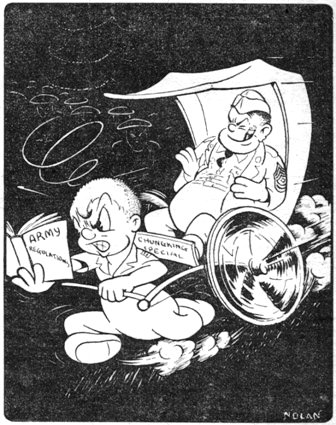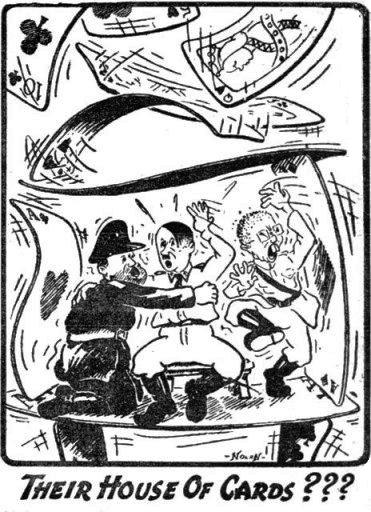
VOL. I NO. 10 DELHI, THURSDAY NOVEMBER 19, 1942.
From Delhi First contributions for the relief of sufferers from the Bengal cyclone are in. That they are not larger is due to the fact that it takes time to get organized - we conceded that we hadn't had time to work out details when we launched the C.B.I. Roundup campaign in last week's issue. First off we had to decide the best way to put funds collected to work. We elected the Indian Red Cross Society as agent. Sardar Bahadur Balwant Singh Puri, the secretary of the national organization here in New Delhi, will forward all contributions direct to workers of the Bengal Chapter who are in the field. All monies from American troops are ear-marked for this particular relief job and there will be no deduction for overhead. Every anna in every rupee will be spent to relieve distress among the cyclone's victims. Officers appointed by General Stilwell's India Headquarters to be responsible for the collection of funds in their respective branches are: Col. Richard D. Daugherity, Branch Headquarters AF in CBI; Lt. Col. Samuel T. Moore, 10th Air Force; and 1st Lt. Julian H. Bowman, S.O.S. Lt. Bowman is named Custodian of Funds. An invitation to all American Army troops at other stations in India and China to contribute will go out this week. It is emphasized that all contributions are voluntary and the Roundup will refrain from publishing any no-poppy-no-mommy, give-until-it-hurts exhortation. We will just say that the Bengal cyclone was a disaster of the first order and the Indians in distress are to be numbered in hundreds of thousands. The staff of the C.B.I. Roundup opened the pot with a 100 chip donation. Miss Nickerson, the American Red Cross representative here, tossed in 20 rupees. The officers of Headquarters, 10th Air Force, here in New Delhi, have already kicked in Rs. 640 and Branch Headquarters, Army Forces in C.B.I. fattened up with an additional Rs. 2410. Both the latter organizations have further contributions pledged. So we have Rupees 1,000 as a start with all units in New Delhi and elsewhere still to be heard from. Additional contributions will be acknowledged by the Roundup as far as security permits until the campaign closes on December 15. |
|
FIVE NEW BRIGADIERS APPOINTED
The Stilwell group jarred loose with four new brigadier generals last week and the S.O.S. came through with one. One star fell on Chungking, one on New Delhi and three on the Chinese-American Training Center in eastern India. It can be said that the recipients are happy about the whole thing. Benjamin G. Ferris, chief of staff of the Br. Hq. U.S.F. C.B.I. in New Delhi, is now a one-star general He was formerly G-4 of the First Army under Lt. Gen. Hugh Drum. He came to Burma last March to be Lt. Gen. Joseph W. Stilwell's G-4 during the Burma campaign. At the conclusion of that campaign he participated in the little 150 mile stroll out of Burma. General William (Bill) Powell also came over with "the old man." He is the theater G-1 and holds forth in Chungking where he has been from the start with the exception of trips to Burma and India. Powell was Stilwell's G-1 when the latter commanded the Third Army Corps, stationed in Monterey, Calif. He hasn't had a chance to take a long walk like General Ferris has. General Frederick McCabe is commandant of the Chinese-American Training Center. He was with Stilwell as G-3 of the 7th Division at Ford Ord and later as G-3 of the Third Army Corps. During the Burma campaign he acted as liaison officer with the Sixth Chinese Army over in the Shan States. Yes - he walked out too. General W. H. Holcomb is running the S.O.S. down at the Chinese-American Training Center. He started out in this clam bake with Stilwell in Burma like all the rest. As an engineer officer he spent a lot of his time touring about North and Central Burma, checking on roads, bridges and possible air fields. Before joining Stilwell, Holcomb acted as assistant commandant of the Engineer School at Fort Belvoir, Va. The baby of the new appointees is General Hayden L. Boatner. He is a member of the West Point class of 1923 and was only made a colonel last June. Before coming to Burma with the Stilwell group he had organized the original MacGruder mission and acted as its Washington representative. He didn't walk out with Stilwell. He went up the Burma Road into China with the rest of the Americans and others who were in Lashio. At present he is Chief of Staff of the Chinese Expeditionary Force and is stationed at the training camp. |
By WALTER BRIGGS
War Correspondent United Press
Assam - The establishment of a ring of air warning posts surrounding this vital area has taken one United States Army unit far into the jungles of Burma on the fringe of Japanese-occupied territory.
Accompanied by a detachment of British-officered Indian troops, these young Americans slogged through some of the toughest country in the world - miles of swamp, dense foliage and steep mountains - to a mountain-top hut from where they will watch for approaching Japanese planes.
Since transportation of supplies by land is practically impossible, the India-China Ferry Command is operating from this base to supply the warning crew with equipment, food, clothing, ammunition and mail. Transport pilots handling the job are the same who fed refugees streaming from Burma during the past six months.
SAME METHOD
The method is the same: gliding over the camps along the route and kicking out supplies in gunny sacks or dangling from parachutes. Pilots are rotating the task of supplying units far in the mountains, where the planes fly dangerously near Japanese airfields, dodging in and out of narrow valleys. Even Group Commander Lt. Col. Julian M. Joplin occasionally takes a shot at the job. "Jop's" most recent mission not only resulted in the successful delivery of hundreds of pounds of supplies, but also produced one of the literary masterpieces of the war.
A few days after Jop made a trip a native runner arrived at these headquarters carrying, among other communications from watchers, a letter from Sergeant Martin C. Thrailkill to his pal, Sergeant William E. Russell, Jr. Russell is in charge of assembling supplies and kicking them out of the plane over the watchers' camps. The letter said:
BOMBARDIER KID
"Sometime in October; colder than hell. Dear Russ, alias the 'Bombardier Kid':
"This few lines is from myself and the rest of the boys of Kunz' (Team Chief Sergeant Peter J. Kunz) Expeditionary Force now on active duty in Burma. By active, I mean just like a mountain goat...
"You should get into bombardment, kid. This side-of-the-mountain village was full of excitement the first day you dropped rations. Here's a report of the 'ration raid':
"Direct hit on camp cot; near miss on a mess hut; five direct hits on houses in the village (one of them twice); casualty, one Indian (not serious and recovered) who sustained a direct hit from a mail sack - thank gosh for small favors...
THANKS FOR MAIL
"Incidentally, Russ, thanks for the mail. We didn't expect it so soon. A package for me had a box of Roi-Tan cigars. It was busted all the way to hell, but I can smoke them. fact is, I'm smoking one now...
"We had a big feast at the village last night. It happened I got there just when they were preparing the feast. The Nagas served roast buffalo, rice, rice beer (25 percent alcohol) and we had a hell of a good time. Everybody sang and danced and the whole thing looked like a cannibal feast. There's only been 10 white men through these parts since 1880, so you can see these people are far from being civilized...
RUSH SHOES
"The trails are rough and really hard on shoes. Please rush me a pair...
"Our medico is treating a little bit of every kind of emergency case up here. Right now he's over delivering a baby in the village.
"If you've an opportunity get some vegetable seeds, since we're going to be up here long enough to grow a few.
"Our main amusement is sitting around the campfire at night shooting the bull. There's nothing else to do and you end up pretty tired after walking around the mountains all day long.
"FLASH! The boys just returned from the delivery. It was a boy! "Guess I'd better close. There's still seven days more of walking and we're starting out early again tomorrow.
"As Ever, Betel Puss."
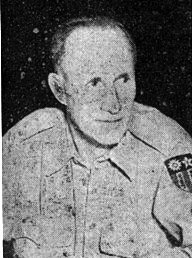
|
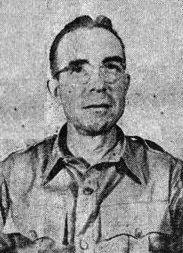
|

|
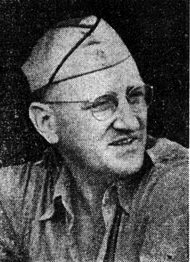
|
10TH AIR FORCE FLIERS GET SILVER STAR
The Silver Star was awarded six officers and two enlisted men of the 10th Air Force who recently participated in an air raid on the Japanese Concession in Hankow, China.
They were: 1st Lieutenant Robert B. Klemann, pilot; 2nd Lieutenant John Tyson, co-pilot; Arvis R. Kirkland, navigator; Charles H. Dearth, bombardier; Staff Sergeants Noble Brown, engineer and Adam R. Williams, gunner.
The citation read:
"The actual bombing of Hankow was performed in the face of heavy anti-aircraft fire but so precisely did every member of this crew perform his assigned duties that every bomb dropped was seen to land directly in the target area. This one mission was responsible for the destruction of large quantities of gasoline and other war supplies in addition to several hundred enemy casualties, and further resulted in shattering the enemy's confidence in their protection against air raids, as evidenced by Chinese intelligence reports confirming the results of this raid.
"Such gallantry in action in the face of heavy anti-aircraft fire while carrying out a successful attack in an area known to be defended by superior numbers of enemy fighters is characteristic of the finest traditions of the Army Air Forces."
|
By Pfc. ROGER L. WHEELER
It is appropriate that we start the column this week by making mention of the boys in the Fighter Squadron Headquarters. You know of whom I speak. The boys who look over the Roster each day and can find no one but you to put on guard or K.P. for that day or week, respectively.
We realize now that they should have had mention in the first write-up, but "better late than never," we say. In this Fighter Squadron we have six men to look after and do the paper work for us.
Namely, 1st Sgt. Valerio, who is the chief cook and bottle washer. He took over that job some months ago when Sgt. Leo (Chum) R. McNeven (now Master Sgt. somewhere in China) withdrew to receive the said rating. Next, comes S/Sgt. John Morley (over the top at seven boys) Burke.
WHO'S BUCKIN'
John who sees to it that the payroll gets in so we G.I.'s can get paid, come the first of the month, keeps tab on the first sergeant. S/Sgt. Baygents who is the all around boy and looks after everything from seeing to it that you get your guard duty regularly to keeping down rumors, is the next in line and comes from Missouri. You have to "show him boys, you have to show him."
S/Sgt. Lopour is another important link in headquarters and claims Nebraska his home. (That is, when he is in the States) his efficient work explains his rank. Of course we mustn't overlook the corporals.
Corp. Burton is another Missouri man (as are most of the squadron). His duty is to see that the rest of 'em keep busy. Also there is Corp. Edson who, we might add, sees to it that Corp. Burton "sees to it" that everyone else is on the beam. In other words, the (high Muckity Muck) of the bunch. For any details we
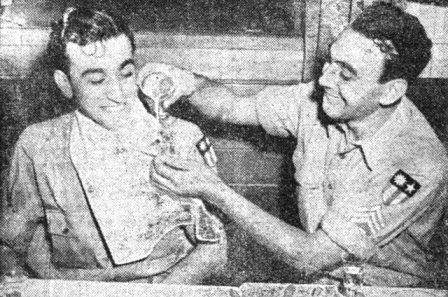 JOY COMES TO "WOEFUL WILLIE" - Anthony J. "Woeful Willie" Longo, formerly a sergeant in an Indian APO, has
always been a bit distressed with what goes on in this mad, mad, world. Recently, however, he was made
a second lieutenant and now everything looks pretty good to him - so good in fact he bounced for a party for
all his old pals among the enlisted men. Sgt. Richard Pastorino, his APO colleague, pours the glass of
"champagne" over the new bar.
JOY COMES TO "WOEFUL WILLIE" - Anthony J. "Woeful Willie" Longo, formerly a sergeant in an Indian APO, has
always been a bit distressed with what goes on in this mad, mad, world. Recently, however, he was made
a second lieutenant and now everything looks pretty good to him - so good in fact he bounced for a party for
all his old pals among the enlisted men. Sgt. Richard Pastorino, his APO colleague, pours the glass of
"champagne" over the new bar.
|
Edson wants S/Sgt. Davidson named as the one who gets all the mail. Sgt. Davidson, by the way, is the sergeant who, when not on guard, is supply sergeant. Last but not least is Corp. Miracle, who is attached and sees that the boys receive their mail O.K. Corp. Miracle comes from Ohio of which he shouldn't be ashamed of by looking at football scores Ohio is piling up this year.
ORDERLY ROOM
Now that we have covered the personnel of the orderly room, let's go to the orderly room itself and see what they have there. The gang got their heads together a while back (believe it or not) and under the direction of Sgt. Valerio, decided to have an up to date office. Squadron carpenter S/Sgt. Eble took care of their ideas, and with his men, Pfc.'s Northcraft and Brockman built the office into reality.
Results therefrom, the Squadron has the model Army office. Not only do they have consultation rooms partitioned off but also a drinking fountain (with a cup if you bring one), radio, and other odds and ends that go to keep the morale of the personnel on the up grade. Under the leadership of the Commander, Major Paul C. Droz and Squadron Adjutant Capt. William C. McConnel, this Fighter Squadron boasts of one of the best orderly rooms and personnel in this section of India. "That's all folks, see you next week."
WE HEAR FROM THE U.S. FERRY COMMAND
By Pfc. THOMAS L. HAMAN
Who's "On the ball?" The I.C.F.C. boys, of course. Did you say "Prove it?" O.K. Buddy, here goes.
Place yourself in our shoes as we go through a busy day, and by the way, let's start the day off right. Here we are, located just beyond the end of the runway in our tents, sound asleep - dreaming, perhaps, of the little lady back home - when all of a sudden the 1942 version of an alarm clock, a squadron of P-40's on dawn patrol duty, take off. No whistle or bugle is needed, and also no daily dozen. The vibration created by the dawn patrol limbers each individual muscle and sets the circulatory system in active service for the day's hard work ahead.
A quick trip to the showers, resulting in an "eye wash" is soon followed by a rush to the chow house for eggs (as you like 'em) and the regular cup of breakfast stimulant (coffee), as well as the other ingredients that form a well-balanced diet.
FLYING BOX CARS
Now, off to work we go. The regular job (policing work quarters) comes first, and is soon followed by the drone of incoming flying freight cars. We all act as a reception crew - baggage, freight and all is soon removed, and the big air buggy placed in a favorable place for a good working over.
Our specialists, of whom I shall introduce a few, speed to their posts like mad, intent only upon placing that flying Jenny, fully loaded, back en route to the house of Jap destruction. The two most outstanding specialists of our group are the famed songsters, Private John "Flusho" Sybo and Pfc. Earl "Draino" Straffon. Their harmony keeps the group's morale high even when the sun says 132 degrees Fahrenheit, and the grease and dirt gets an inch thick on the handsome face of the rest of us.
Air Buggy No. 1 and No. 2 are back on the ready line; No. 3 and No. 4 are just being brought up - but wait a minute, it is time for early chow. Another specialist, Finis L. "Caesar" Smith, makes a rush job in his rumbling taxi for the clerks and returns immediately to pick up half of the laboring crew for an early chow (fit for a king), and, by the way, all praise for the chow goes to the cooks and staff in the special troops mess hall.
LIGHTING TROUBLE
Chow over, we all go back to our duties as furious as ever. The afternoon continues, and more specialists get recognition. Pvt. Leonard S. "Egghead" Egyed finds lighting difficulties and being an intelligent man, he dons his best "hunt and seek" appearance, and with the aid of his helper soon has repaired the shortage. By this time, planes No. 7 and No. 8 have been put in
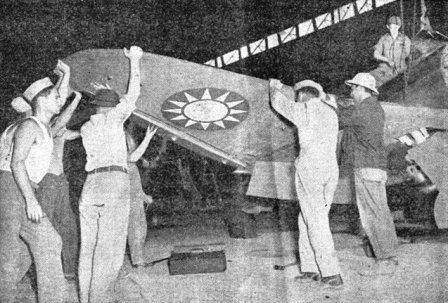 FIGHTERS FOR THE CHINESE - One of our jobs in this theater is to move fighter planes over the "Hump" to
the Chinese Air Force. Here American soldiers put one of the ships together on an Indian assembly line.
FIGHTERS FOR THE CHINESE - One of our jobs in this theater is to move fighter planes over the "Hump" to
the Chinese Air Force. Here American soldiers put one of the ships together on an Indian assembly line.
|
It is chow time again, and though we are hungry, we hesitate to leave our work for fear of losing a moment's time against those squint-eyed devils across the hump. With chow over, again we resume our work, and even though we are tired our spirits are high - for flying buggys Nos. 9 and 10 are en route to their destination. No. 11, the last one for today, is awaiting its repairing and polishing.
Some more of our specialists come into the picture - M/Sgt. Judd "Cowboy" Gray and his assistant Engineer Chief Melton E. "Tex" Adams go into a huddle and get the book work straightened out and completed. That writes finis to their hard day of instructing advising and overseeing the entire project.
There are many other specialists in our outfit, but due to the lateness of the hour, we only have time left to mention "Tarzan" Roy L. Galbrecht - better known as "Lady Killer." At the present "Tarzan" is taking quite a verbal beating from the boys for fuming about having to break that date tonight. We sympathize with him, but deem our country comes first.
With that our day closes, and we resume the dream of the beautiful young lady on the other side of the pool.
SPORTS SHORTS
Ping pong died an early death at the Tenth Air Force day room when the Y.M.C.A. team ignominiously defeated the Squadron Five by twenty-four games to one. The G.I.'s just weren't in the same class with their opponents. The scores were close in most cases, but never quite enough. Saggerman scored the sole Squadron success of the evening. Sgt. Jack Supman, Corp. E. M. Webeler, Pvt. jack Caplan and Sgt. Ellis never made the grade against Indian National Champion Ayub and his teammates Harjan, Krishna, Parkash and Roy.
The football season got into full swing this week as E Bay, the Guards and B Bay romped home to victory. A long pass from Pvt. Kenny Swann to Lopollo resulted in a touchdown which supplied E Bay with its slight margin of victory over the S.O.S. footballers who had completely dominated the game up to that point. The final score: 7 to 0.
In the game between the Guards and A Bay, there was some wild and wooly football despite the one-sided score of 19 to 6. Led by their captain, Sgt. Farkas, the A Bay team actually seemed to end up stronger than the winning Guards. Baker, Kowalski and Light of the Guards did a bang-up job on A Bay, nevertheless, with Decker and Johnson fighting them at every turn.
Despite the defensive put up by Tiger Joe Malinas and Center Rex C. McGagin of the Signal team, they were out-dazzled by the speed, power and deception of B Bay, the latter winning 32 to 0. Evans, Hostenske, Saidikowsky, Meshkofski, Hunt and Kahre starred for B Bay.
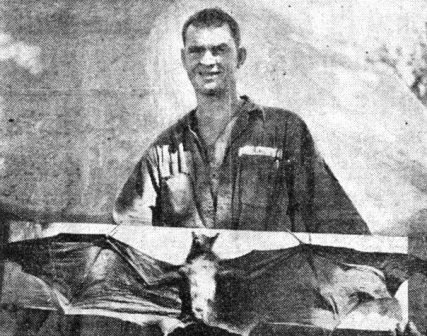 COW-TOWN KILLER - S/Sgt. Houghston McHone, one of the boys from Fort Worth, Tex., gives proof of his prowess
with a sling-shot. It's the largest bat seen in the vicinity of his air depot with a wing-spread of four
feet two inches.
COW-TOWN KILLER - S/Sgt. Houghston McHone, one of the boys from Fort Worth, Tex., gives proof of his prowess
with a sling-shot. It's the largest bat seen in the vicinity of his air depot with a wing-spread of four
feet two inches.
|
AIR DEPOT GROUP TAKES
FIRST GAME OF SERIES
The Air Depot Group baseball team outplayed the Tenth Air Force, taking the first of a three game series, 11 to 3. The invading Depot team had the game won after the third inning when the home team's star pitcher, Sgt. Clement Hupfer, sustained an injury to his arm. At the end of the third the score stood at 1 to 0, with the visitors held hitless by Hupfer's hurling.
The Squadron team got its first deluge in the fourth, when a shower of hits from the bats of Duffin, Guyton, Post and Miller overwhelmed pitcher "Red" Saunders, six runs coming in during that frame. Crowley took over for Saunders but despite some excellent pitching on his part he allowed five more runs to cross the plate, leaving it pretty soft sailing for the visiting tossers, Kareka and Parra. Those last two did a good job of it, allowing only nine scattered hits between them.
Hubbard of the Depot Group and Webeler of the Tenth Air Force shared the fielding honors. Hubbard snatched an almost certain home run from Crowley when he backed up against the right-center wall to snag a high one. Webeler played perfect defensive ball. He also knocked out three hits, which were tops in this game. The only home run of the game was batted in by Van Hevele, of the losing team, who whammed the old apple deep into the left centerfield shrubbery.
Next Sunday the Tenth Air Force will play on the home grounds of the depot group. With Sgt. Hupfer back on the mound and his teammates firmly determined to return with the Championship, the double-header scheduled should prove even more exciting than the first game.
Service Squadron Victor In Field Day
By Corp. FRANK E. GINGRAS
The November field day meet sponsored by the Base Special Services Office, was held by this Service Group Squadron with seven units entered. This Squadron came through with flying colors and went home with a beautiful silver trophy donated by the local Enlisted Men's Club.
One of the outstanding events was the baseball throw. Corp. John Drapp, Jr., of a Photographic Squadron heaved the old pill to a distance of 314 feet 4½ inches.
Under the rules governing these Field Days, one commissioned officer from each unit entered may compete in any two events. The Tarzan-built Lt. Victor J. Thompson decided to give a helping leg to his unit, thereby winning the Standing Broad Jump. Without the willingness and cooperation of Lt. Thompson, the Services Squadron might not have been victorious. The previous Field day found Lt. Mitchell, Fighter Group, setting the pace for a final victory for the Fighter Group. Mitchell entered the Shot Put event and won last time.
The singles in Horseshoes found Pvt. Charley Hill to be the final winner. Doubles in Horseshoes was won by Cpl. Collins and Pvt. Vaughan. Vaughan also won the Basketball Throw. The 50-yard dash saw Cpl. Al Mosely far in the lead for an amazing victory. The 100-yard dash was won by Pvt. John Bolin. The 440-yard run was bagged by Pvt. Theo. Robertson of a Q.M. Company. The Q.M. Company won the 440-yard relay. Prestley "Big Chief" Ware kicked the ole pigskin to win the football punt. Cpl. Victor Nolan, of a bomb unit "putted" the sixteen pound shot farther than any of his opponents. Pvt. Ingram followed Lt. Thompson's footsteps by winning the running broad jump. Pvt. Bergmann cleared the bamboo and beat Pvt. Ingram for first place in the high jump.
Great team co-operation was displayed among the bomb units as they won the three remaining events, namely: the volleyball tournament, the three-legged race and the tug-o-war tournament. Two silver trophy cups were awarded the bomb units for their victory in the volleyball and the tug-o-war tournaments. These cups, donated by local merchants through the special services officer, Lt. W. G. Phillips, must be won three consecutive times by the same unit before they are retained permanently by that unit.
The victorious unit claims that it will win the coming Field day of December whereas the second placer, a service squadron, which, by the way, is the Baseball League champ, expect to win the next one. All we can say is time will tell.
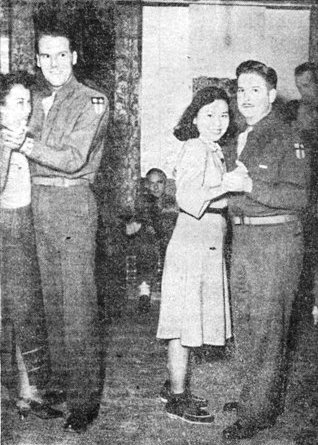 CHUNGKING BALL - The boys didn't do so bad at the Victory House ball up in Chungking judging by this
picture. Dancing with the two little Chinese dandies are Sgt. Jesse McCorkle and T/Sgt. George Vernon.
CHUNGKING BALL - The boys didn't do so bad at the Victory House ball up in Chungking judging by this
picture. Dancing with the two little Chinese dandies are Sgt. Jesse McCorkle and T/Sgt. George Vernon.
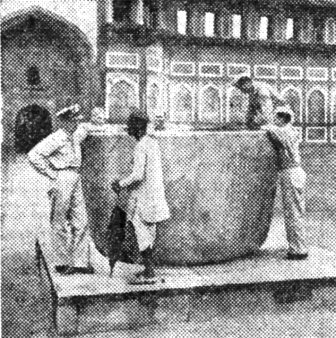 MAMMOTH BATH - Sightseeing U.S. officers and men examine a gigantic bath tub hewn out of a single block
of stone at an old Indian Fort. Emperor Jehangir bathed in the big tub. The sightseers are Lt.
John C. Whatley, Sgt. Leroy R. Berg, Pfc. John C. Byrom, Jr., Sgt. Robert L. Snyder and Corp. Louis J. Ryba.
MAMMOTH BATH - Sightseeing U.S. officers and men examine a gigantic bath tub hewn out of a single block
of stone at an old Indian Fort. Emperor Jehangir bathed in the big tub. The sightseers are Lt.
John C. Whatley, Sgt. Leroy R. Berg, Pfc. John C. Byrom, Jr., Sgt. Robert L. Snyder and Corp. Louis J. Ryba.
|
If India's Radio Went Commercial What Then ?
Capt. Edward D. Andrus of the 10th Air Force has been worried recently about what might happen if a revolution took place within the walls of All India Radio and that institution went "commercial" in the American sense.
He thinks the following examples might be the result: -
1. "Do you hate to look in memsahib's mirror because you have pimples? Do people stare at you out of the corners of their eyes? Do they stare at you at all? Ugly faces that repulse love are made beautiful in a few days by using Ghora Munh cream at Rs. 10-8 a jar."
2. "Who is out with your girl tonight? How did he get her there when you couldn't? Simple! He had Pashawnspeereetol, the old standby of experienced lovers. You can buy the stuff anywhere it is sold for a few annas an application."
INDIAN SEAPORT HALLOWE’EN PARTY
By Sgt. N. PATRICK ROSSO
American Negro troops of this Indian Seaport town gave astonished Indians their first glimpse of an American Hallowe'en party.
The affair was held at the local hall which, under the supervision of Mr. Conrad, club director, was beautifully decorated in typical All Saints night regalia.
The men were attired in fashionable G.I. denims with accessories to match and the women wore Indian gowns ranging from the ridiculous to the sublime.
Highlight of the festivities was the awarding of a prize to the woman wearing the most original gown. This prize went to a local Indian miss attired in a gown patterned after the fashion of Old Glory . . . a veritable Indian style, "Miss America."
Equipped with masks, comical hats and noisemakers, a most enjoyable time was had by all who attended, and it can be truthfully added that all present did all in their power to dispel the ghosts and goblins who come to haunt us on this All Saints night.
VOX POPULI
Sir - By way of brief introduction, it is sufficient to say that I am an ardent reader of the C.B.I. Roundup. The entire publication is a welcome attraction but I must confess that the published football scores of the Syracuse University and the Poet's Corner are my favorite printed gems.
The poem, "We Swoop At Dawn" by Captain John W. Carpenter, III was exceptionally fine (Ref. C.B.I. Roundup Nov. 5, 1942) I sincerely feel that all who read it were impressed by its text.
My personal emotions were stirred by the pathos evolving the fate of the side gunner, i.e. "But we'll miss the side gunner, the big country lout." Consequently, my sympathies are herewith enclosed as rhymed impressions. (See Poet's Corner - Ed.)
"The Stars Came Down" is dedicated to that hero, the side gunner.
- Pvt. ROBERT E. HOLLINSHEAD
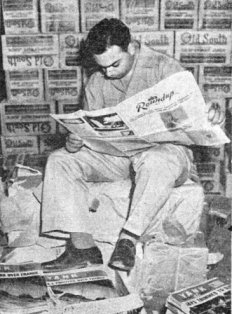 AS IT SHOULD BE - T/5 Max Nahman uses a stack of Yank for a seat while he gets the news in the
Roundup. The shot was taken down at an Indian port.
AS IT SHOULD BE - T/5 Max Nahman uses a stack of Yank for a seat while he gets the news in the
Roundup. The shot was taken down at an Indian port.
|
Squadron Silhouettes
By Corp. JACK BLUMENFELD
Boo Hoo - Gas! - This week the G.I.'s turned out for Gas Mask Drill and had to go through a chamber saturated with tear gas. Pvt. Samuel W. Tyree officiated. To start the generator he took out a match, struck it, lit the "doings," and then blew at the match - once - twice - three times. It was not until the laughter of the others in the chamber became audible did he realize that he was wearing his Gas Mask . . . Then there was M/Sgt. Desire D'Orange, who came out crying that this was the first time he had bawled in five years . . . And Pvt. Steve Wolek, medic, who dished out plenty of boric acid eye-wash - and smart talk -until it was his turn to play Weeping Wolek.
Movie Magic - Smash hit with the men this week were the luscious lovelies of "Pardon My Sarong." Most exciting moment came when those glamour glands started shaking on the screen. There was a sudden crash! Hip-notized Pfc. Sehrman Reynolds had broken through his seat, smashing two glasses on his way down.
Gag of the Week - ? - She was only a second-hand furniture dealer's daughter - but she wouldn't allow much on the old Davenport.
Heroism Under Fire - Corp. J. P. McCrone did not know that the swooping, diving airplanes and the booming guns were just part of an A.R.P. demonstration. Come the first burst and he jumped. "Dammit!" He piped up, annoyed. "I skipped a letter." And then he went right on typing, unannoyed by the drone and din. Bravo!
Around the Squadron - The squad of Ghurkas making a tour of the Barracks and impressed T/3 Melvin Justice roaming around with a far-away look in his eyes - as far-away as Quetta, where Peggy is, we presume... The "petrol" stove back in the kitchen pulling one of its periodic explosions, this time on Pvt. Lawrence Evans... And where are those "Smokes for Yanks?"
Could Be! - The tenor had just finished singing "When Irish Eyes Are Smiling" for the crowd and returned to his table. He was greeted by a slightly tipsy British parachutist who congratulated him with the compliment that "Only a true Irishman could sing it that way. By the way, what's your name?" "Bruno Nicknadarvich" came the smiling reply. The parachutist beamed. "I just knew you were Irish."
Christmas Flowers - S/Sgt. Chester Shea isn't going to take advantage of the Red Cross offer to send home a bouquet of flowers by Christmas. "By the time they get there," he says, knowingly, "they'll all be crushed."
Up They Go - There were a lot of stripes issued this week. Frank B. Houghton now wears three. Our newest Corporals are Audrey L. Brandon, George J. Harless, Envor E. Johnson, Warren H. Johnson, Lamond W. Kinsey, Walter B. Kowalski, Warren W. Smith, John Rushnok, Melvin D. Tinsky and Carl H. Lietzke. Making the only permanent grades around, that of Pfc. are Charles J. Lockavich, Cyrus A. Pettigrew, Martin T. Quigley, Otha D. Smith, Ira L. Spinks, Norman M. Thompson and Henry J. Webster.
Soldiers Urged To Use V-Mail
Soldiers in this theater are asked by Lt. Col. E. E. White, Theater Postal Officer, to make more use of V-Mail. In areas where microfilmed V-Mail is not in operation. V-Mail receives a priority in handling and dispatch by the War Department. As a result its transmission is faster than either regular or air mail, White said.
Criticism of the V-Mail Service has been made in that it takes about four weeks for this class of mail to arrive from the States. The delay is caused by stopping the film en route for processing, as the unit here is short of a paper processing machine, according to the postal officer. Every effort is being made to secure the necessary machine with a view to having the letters reach us in the same time as Air Mail. It is pointed out that V-Mail letters from this theater are being delivered in the States in about two weeks, the same as ordinary and Air Mail.
Information has been received from Washington that all V-Mail letters sent to the United States from this theater to October 19th were received and reproduced there by October 26th.
White states that an order of preference in dispatching mail overseas is that official Air Mail is first, V-Mail second, and to the extent space is available, other letter mail weighing not in excess of two ounces per letter, is third. White suggests that should you write more than one letter per week, to send one ordinary letter and the balance V-Mail.
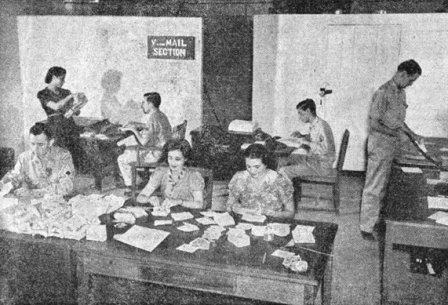
|
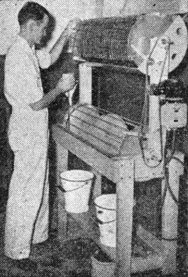
|
 THE STARS CAME DOWN The stars came down and spoke last night The stars came down, bestowed their blessing On my troubled soul, Inspiring stars, celestial bright; I was at peace, soothed by their caressing. My friends, the stars, were loving, fond, Reflecting the beauty of their universe They released my soul from its earthly bond And I was free, free; We could converse. They spoke to me and I to them They spoke of love and showed me love I was enfolded. They crooned a hymn. And I traversed the heavens, with them, above. Compassionate were my friends, the stars, And I was lulled to a dream of peace. A dream of peace. Obscure, the War Lord Mars. Oblivious, for me all war did cease. Unuttering, I dreamed and thought of home, And lo! I was home. I saw the field, And father toiling. He couldn't have known. Yet, he faltered, as though I'd been revealed. He passed his hand across his brow, And gazed, smitten, into the sky. → |
|
We passed. He returned to the plow. As a vision, I had passed him by. He couldn't have known, yet he knew, And realization tore his aged heart. Loving, my father knew what was true; Knew his son, and life, were apart. The heavens beckon, my life is spent. I'm home again. I am sublime. My friends, the stars who spoke, were sent To usher me to him Divine. I resteth now, free of strife. You, America, are at the helm; I resteth now. I gave my life. The stars have borne me to His Realm. - Pvt. Robert E. Hollinshead A PHILOSOPHY Like a lion I came into being - Yes wailing and screaming in fear Gazing on life without seeing While clinging to life so dear. As years come and go beside me I have changed from the days of yore Yet always I know, inside me My soul is the same as before. I have hurt many friends in my season I have closed my eyes to their pain I have wrenched their hearts without reason I've allowed myself to be vain. Though I've crossed the breadth of two oceans I have never asked myself why → |
|
I have never shared the emotions Of the peoples of nations that die. I have kept my feelings from showing I've continued to do my job I've prevented myself from knowing The feeling of joining the mob. While those who mean something to me Can hurt me whenever they care No matter however they do me I've always gotten my share. I'm a perfectly normal being Doing whatever I can Though I still gave at life without seeing I've found it's the better plan. There is more to life than enjoyment- There is more to living than fun. There is pleasure in useful employment And pride in a job well done. I'll continue to find my pleasure In gazing on lambent green fields Enjoying myself beyond measure On the little things life yields. I'll continue through life without seeing The trouble that time can bring Depending upon the supreme being Who causes the winter and spring. You can see too much if you're willing Of humanities trouble and woes Though dangerous things are more thrilling I prefer to keep my eyes closed. - Sgt. William H. Fleming |
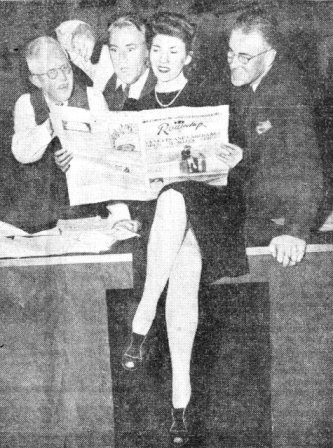 THIS IS WHAT WE'VE BEEN WAITING FOR!! The gang on the San Francisco Call-Bulletin, naturally the
most enterprising paper in the West, comes through with some Roundup promotion. Left is Marsh Maslin,
definitely your favorite columnist the past few months; Chubby Murray Fay, head photog says "Oh!" and points
while City Editor Fred Walker, the most prolific desk man west of Chicago, is on the right. The owner of those
legs is Carol Tiegs, a rewrite man - wow!!!
THIS IS WHAT WE'VE BEEN WAITING FOR!! The gang on the San Francisco Call-Bulletin, naturally the
most enterprising paper in the West, comes through with some Roundup promotion. Left is Marsh Maslin,
definitely your favorite columnist the past few months; Chubby Murray Fay, head photog says "Oh!" and points
while City Editor Fred Walker, the most prolific desk man west of Chicago, is on the right. The owner of those
legs is Carol Tiegs, a rewrite man - wow!!!
|
Dope From Assam Vets
By Pfc. KARL PETERSON
No longer need the boys in the up-country be jealous of the lads stationed at Delhi, that "Indian Seaport Base," and all the other centers of the life sumptuous. You may have your dances, athletic programs, and sundry other luxuries, 'cause we-e-e-e had an AIR RAID by the nasty Nips, and now we're all veterans under fire, heroes, warriors, and ain't you green with envy?
Seriously, the home team did all right, but then everybody knew they would all the time, so skipping the verboten details of the set-to itself, a few impressions just after everybody came up for air.
BIRDS SINGING
Immediately after the last detonation, the countryside lovely and peaceful as ever, sun shining, flowers in bloom, birds singing unconcernedly. The sheepish faces of the crowd at the latrine, whatsamatter, boys? Gesticulating anecdotes of where-I-was and what-I-did. The souvenir scramble - well, yes, there were souvenirs, but we ain't saying how many.
Three of our heroes who will never get a Silver Star are Corp. Harvey Mahan and T/5 gr'ers Billie Martin and Ed Looker, who were detailed to guard an ominous "unexploded bomb," located by some enterprising soul just after the attack. All night long, with their hearts in their throats, they warded passersby from the engine of destruction and waited for the awful blast, until the rational light of morning revealed - well, just a half-buried old rusty length of pipe.
MISSED CALLING
Sgt. William Russell, the genial supply man, emerges as a bombardier who missed his calling. A letter from S/Sgt. M. C. Thrailkill, to whose detachment on duty in the hinterland. "Russ" dropped rations from the air recently, gave the following results: one direct hit on the party's equipment, a near miss on a motor, and five direct hits on Indian huts, causing one slight casualty. Says Russ modestly, "Naw, I don't use a Twitchell super-secret sight, just plain old dead reckoning."
And lastly, the Croix de Stout Fellow (with palm) to Pvt. William Potts and T/4 gr Roy Young, medics on duty with the aforementioned camper-outers, who have handled "situations" in fine style. Potts in his spare time delivered an Indian baby boy of unannounced weight in best country-doctor tradition. Young brought Pvt. Francis Aust safely through the crucial stages of a severe malaria bout without having to ship him in to the base.
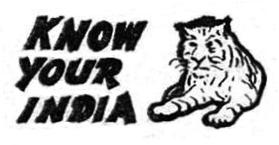
|
|
South of the Ganges and Indus plains is the huge plateau, called the Deccan, which covers a big part of India. The Central Provinces, the princely states of Central India, and Rajputana are the northernmost parts of this area. They are not heavily populated nor as rich as the provinces of the plains to the north, since the land is more rocky and barren.
Along the west coast lies the province of Bombay. Its 20 millions are of many different stocks. In the city of Bombay, second largest in the country, you will see Parsis (Parsees), whose religion is different again from those already mentioned. They worship Zoroaster and their sacred book is the Persian scripture called the Avesta. At death, they are neither buried like Moslems nor burnt like Hindus but are given to the vultures, in order not to pollute the elements. The Parsis are a very progressive community and among them are some of the best business men and the most advanced industrialists.
From Bombay also come the Mahratta fighting men, the tough soldiers from the hill country whose regimental honors are many and well deserved. They speak the language called Marathi which is, together with Gujarati, the common language of the province.
Both these languages, and those of most other parts of India already mentioned, that is, all except the south, are called "Aryan" and are descended from a single ancestor language. They are now quite different, but all are related to Sanskrit, the ancient tongue which is the sacred language of the Hindus. And they are related farther back in their ancestry, to English and to most of the languages of Europe - all developed out of a single parent language. "Aryan" is a Sanskrit word which means gentleman. It was applied by the early inhabitants of India to their own people. So if there are any true Aryans in the world today, they are these modern descendants of the ancient folk.
Besides Hindustani and the other languages of the north, which are called "Aryan" or Indo-European, there are those of the south, which are not related to them at all and belong to group called Davidian. Tamil is the main language of this group and is the chief one spoken in Madras. This province covers much of the southern part of the peninsula and stretches along the plain of the east coast up to the hilly province of Orissa. Madras is as big as Italy and has a population of 49 million. Its capital city, also called Madras, is third largest in India. The people are more orthodox Hindus than in most other parts. Several important Indian states lie in the Davidian-speaking south. Hyderabad, whose language is mainly Telugu, has a Moslem ruler although most of the population is Hindu. Mysore state is noted for recent industrial development; its language is Kanarese. Malayalam is spoken in the Indian states of Travancore and Cochin at the very tip of the peninsula.
The C.B.I. Roundup is a weekly newspaper published by and for the men of the United States Army Forces in China, Burma, and India, from news and pictures supplied by staff members, soldier correspondents, Office of War Information and other sources. The Roundup is published Thursday of each week and is printed by The Statesman in New Delhi, India. Editorial matter should be sent directly to Capt. Fred Eldridge, Branch Office Hq., U.S.A.F. C.B.I., New Delhi, and should arrive not later than Monday in order to make that week's issue. Pictures must arrive by Sunday and must be negatives or enlargements. Stories should contain full name and organization of sender.

NOVEMBER 19, 1942
Adapted from the original issue of CBI Roundup
Copyright © 2009 Carl Warren Weidenburner
TOP OF PAGE PRINT THIS PAGE ABOUT THIS PAGE SEND COMMENTS
PREVIOUS ISSUE CLOSE THIS WINDOW NEXT ISSUE
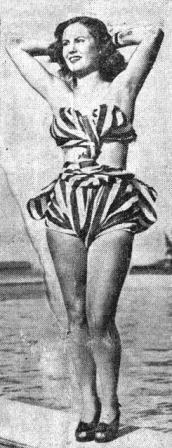 SHE MADE IT FOR 60 CENTS! Dorothy Crowder of Los Angeles displays the "drape-shape suit" she made for
herself out of 60 cents worth of silk-sheen drape material.
SHE MADE IT FOR 60 CENTS! Dorothy Crowder of Los Angeles displays the "drape-shape suit" she made for
herself out of 60 cents worth of silk-sheen drape material.
